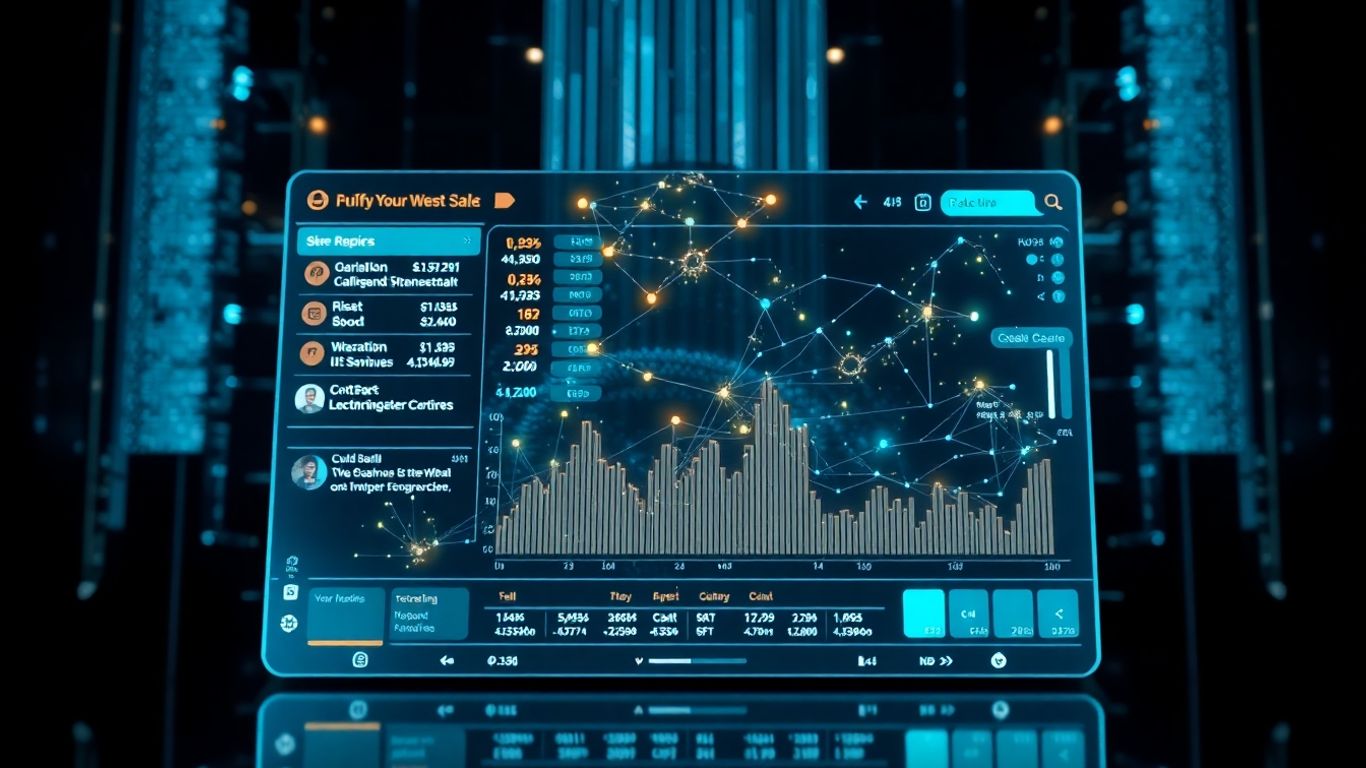[ newsletter ]
Stay ahead of Web3 threats—subscribe to our newsletter for the latest in blockchain security insights and updates.
Thank you! Your submission has been received!
Oops! Something went wrong. Please try again.
Explore innovative blockchain technology solutions transforming industries by 2025, enhancing security and efficiency.





Blockchain technology is not just about cryptocurrencies anymore. As we approach 2025, it's becoming a vital player in transforming various sectors like finance, healthcare, and supply chains. This article explores how innovative blockchain technology solutions are reshaping industries and what the future may hold.
Blockchain tech is really shaking things up in the finance world. It's not just hype; it's changing how money moves and how we interact with financial systems. Think faster transactions, better security, and fewer middle men. It's a big deal.
DeFi is where it's at. It's basically banking without the bank. People can lend, borrow, and trade directly with each other using smart contracts. No need for traditional institutions. It's like a whole new financial playground, and it's growing fast. The returns can be pretty good, too, which is why so many people are jumping in. It's not without risk, of course, but the potential is huge.
Smart contracts are automating a lot of the stuff that used to require humans. Think about loans, insurance, and even trading. These contracts can execute automatically when certain conditions are met. This means less paperwork, fewer errors, and faster processing times. Banks are starting to see the potential, and they're exploring how to use blockchain trends to streamline their operations. It's all about efficiency and cutting costs.
Sending money overseas can be a pain. It's slow, expensive, and often involves a bunch of different banks. Blockchain can make this way easier. Transactions can be processed much faster and with lower fees. Plus, it's more transparent, so you know exactly where your money is at all times. This is especially helpful for businesses that operate internationally and people who need to send money to family members in other countries.
Blockchain is making things more accessible and efficient. It's not just about cutting out the middleman; it's about creating a more inclusive and transparent financial system. There are still challenges to overcome, but the direction is clear: finance is going decentralized.
Supply chains are complex, and keeping track of everything can be a real headache. But what if you could actually see where your products are, every step of the way? That's the promise of blockchain in supply chain management. It's not just about knowing where something is; it's about knowing its history, its authenticity, and ensuring everyone involved is on the same page. Blockchain-based systems provide end-to-end visibility, enabling businesses to track products from origin to consumer.
Imagine knowing the exact location and condition of your goods at any moment. With sensors and IoT devices linked to blockchain, that's becoming a reality. This setup gives real-time data on location, temperature, and even the condition of the product. All this info is safely recorded on the blockchain networks, letting everyone keep an eye on things and quickly spot any problems.
Counterfeiting is a huge problem, costing businesses billions. Blockchain can help verify where a product came from, making sure it's the real deal. By creating a permanent record of a product's journey, it's much harder for fakes to slip through. This is super important for things like luxury goods, pharmaceuticals, and even diamonds.
Smart contracts, those self-executing agreements, are changing how supply chains work. They can automatically handle compliance with rules, making sure products meet quality and safety standards. This cuts down on the risk of fines and builds more trust with customers. It's like having a robot supply chain assistant that never sleeps and always follows the rules.
Think of it like this: every product gets its own digital passport. This passport records every step of its journey, from the factory floor to the customer's door. No one can change the information, and everyone can see it. This level of transparency builds trust and makes the whole process way more efficient.
Okay, so healthcare data is a mess, right? It's scattered, insecure, and often hard to access when you really need it. Blockchain could seriously change things. Imagine a world where your medical records are safe, easily shared with your doctors, and you actually have control over who sees what. That's the promise of blockchain in healthcare.
Blockchain can make patient records way more secure. Think about it: instead of your data sitting in one central database that's a hacker's dream, it's spread across a network. Each change is recorded and verified, making it super tough to tamper with anything. Plus, you get to decide who has access. It's like having a digital vault for your health info.
Clinical trials are slow and expensive. Blockchain could help speed things up and cut costs. Here's how:
Using blockchain in clinical trials could save time and money, and ultimately lead to new treatments and cures faster.
Counterfeit drugs are a huge problem, especially in some parts of the world. Blockchain can help track drugs from the manufacturer to the patient, making it much harder for fake medications to slip through. This protects patients and helps maintain the integrity of the pharmaceutical supply chain. It's like a digital fingerprint for every pill.

Digital identity is a hot topic, and blockchain is stepping up to change how we handle it. It's not just about usernames and passwords anymore; it's about owning your data and controlling who gets to see it. I was just reading about how blockchain digital identity solutions are becoming more common, and it's pretty interesting stuff.
Self-sovereign identity (SSI) is a big deal. It basically means you, and only you, control your digital identity. No more relying on big companies or governments to tell you who you are online. It's like having a digital passport that you keep in your own pocket. I think it's a great idea, especially with all the data breaches happening these days.
KYC (Know Your Customer) is a pain for everyone. Banks have to do it to prevent fraud, but it's slow and expensive. Blockchain can make it way easier. Imagine a system where you only have to verify your identity once, and then you can use that verification at multiple banks. That's the promise of blockchain for KYC. It could save banks a ton of money and make life easier for customers. I'm all for anything that simplifies dealing with banks.
Data privacy is a huge concern. Every time you sign up for something online, you're giving away personal information. Blockchain can help protect that data. By using encryption and decentralized storage, it makes it much harder for hackers to steal your information. Plus, with SSI, you can control exactly what data you share with each service. It's a win-win. I think we'll see more and more companies adopting blockchain for data protection in the coming years.
Blockchain-based identity systems are not just about technology; they're about giving individuals more control over their digital lives. This shift towards user-centric identity management is a key step in building a more secure and trustworthy digital world.
It's no secret that trust in elections has been shaky lately. People are looking for ways to make sure their votes count and that the whole process is fair. Blockchain tech might just be the answer. It offers a way to create voting systems that are super secure and transparent, which could really boost people's confidence in democracy. By 2025, expect to see more and more places experimenting with blockchain voting.
Blockchain's inherent security features make it ideal for protecting votes from tampering. Each vote can be recorded as a transaction on the blockchain, creating a permanent and auditable record. This makes it incredibly difficult for anyone to alter the results without being detected. Think of it like this:
One of the biggest challenges in many democracies is getting people to actually vote. Blockchain could help with this by making it easier and more convenient to cast a ballot. Imagine being able to vote securely from your phone or computer, without having to go to a physical polling place. This could be especially helpful for people who have mobility issues, live in remote areas, or have busy schedules. Remote blockchain voting could really increase voter turnout.
Transparency is key to building trust in elections. With blockchain, the entire voting process can be made more transparent. All votes are recorded on a public ledger, which means anyone can verify the results. This doesn't mean revealing how individual people voted, but it does mean providing a clear and auditable trail of all transactions. This level of transparency can help to prevent fraud and ensure that the results are accurate. It's a big step towards secure elections.
Blockchain-based voting systems aren't a magic bullet, though. There are still challenges to overcome, like ensuring accessibility for everyone, regardless of their tech skills, and protecting against cyberattacks. But the potential benefits are huge, and it's definitely worth exploring as a way to strengthen our democratic processes.

Okay, so, AI and blockchain? It's not just hype anymore. It's actually starting to do some cool stuff. Think about it: blockchain gives you trust and security, and AI brings the smarts to automate and analyze. It's like peanut butter and jelly, but for tech.
AI can sift through all that blockchain data way faster than any human could. This means we can spot fraud, predict trends, and just generally make better decisions about how to use blockchain. It's like having a super-powered accountant who never sleeps. For example, AI algorithms can analyze blockchain data to detect anomalies, predict fraud, and optimize network performance.
Blockchain is already pretty secure, but AI can make it even tougher. AI can learn what "normal" activity looks like on a blockchain and then flag anything suspicious. It's like having an AI bouncer at the door, keeping the bad guys out. Think about it, AI can help with:
Imagine a place where you can buy and sell AI models, but everything is secured and transparent thanks to blockchain. That's the idea behind decentralized AI marketplaces. It opens up AI development to more people and makes sure everyone gets a fair shake.
It's about creating a more open and democratic AI ecosystem. Instead of a few big companies controlling everything, individuals and smaller teams can contribute and get rewarded for their work.
It's still early days, but the potential is huge. We might see some interesting developments in AI Agents soon.
It's 2025, and everyone's talking about being green, even in the tech world. Blockchain, which used to get a bad rap for gobbling up energy, is now trying to clean up its act. The focus is on making blockchain tech more environmentally friendly. This involves new ways of running blockchains and even using them to help with climate change.
Remember when Bitcoin mining was all over the news for using tons of electricity? Well, things are changing. Proof of Stake (PoS) is becoming more popular. Instead of computers racing to solve problems, PoS lets people validate transactions based on how much of a certain cryptocurrency they hold. This uses way less energy. Ethereum made the switch a while back, and it made a huge difference. Other blockchains are following suit, trying different methods to cut down on power use. It's not perfect, but it's a step in the right direction. For example, blockchain regulations are becoming clearer, which helps drive more secure and scalable solutions.
Carbon credits are basically permits that allow companies to emit a certain amount of greenhouse gases. The idea is to limit pollution by making companies pay for it. But the system can be messy and hard to track. That's where blockchain comes in. By tokenizing carbon credits, you can create a transparent and secure way to trade them. This makes it easier to verify that credits are legit and prevents fraud. It also opens up the market to more people, potentially leading to more investment in green projects.
Imagine a world where you could easily buy and sell solar power directly to your neighbors. Blockchain could make that happen. Decentralized energy grids use blockchain to track energy production and consumption, allowing people to trade energy peer-to-peer. This can help reduce reliance on big power companies and promote the use of renewable energy sources. It also makes the grid more resilient, because it's not dependent on a single point of failure.
It's important to remember that sustainable blockchain is still a work in progress. There are challenges to overcome, like making sure these systems are truly decentralized and accessible to everyone. But the potential benefits are huge, and it's exciting to see how blockchain can be used to create a more sustainable future.
As we wrap up, it’s clear that blockchain is set to change the game across many industries by 2025. It’s not just about cryptocurrencies anymore; this tech is making waves in finance, healthcare, supply chains, and more. With its ability to provide security and transparency, businesses and consumers alike will benefit. Sure, there are still hurdles to jump over, like regulations and tech challenges, but the potential is huge. If companies embrace blockchain now, they’ll be ahead of the curve. So, whether you’re a business owner or just curious about the tech, keep an eye on blockchain. It’s going to be a big part of our future.
Blockchain is a digital system that records information in a way that makes it hard to change or hack. It works like a public notebook where everyone can see the entries, but no one can erase them.
Blockchain makes financial services faster and cheaper by allowing direct transactions without banks. It also uses smart contracts to automatically enforce agreements.
In supply chains, blockchain enhances transparency by tracking products in real-time. This helps prevent fraud and ensures that products are safe and authentic.
In healthcare, blockchain secures patient records and makes sharing data easier. This leads to better care and faster clinical trials for new medicines.
Yes, blockchain can make voting safer and more transparent. It helps ensure that votes are counted accurately and can increase trust in the election process.
The future of blockchain looks promising as it continues to grow in areas like finance, healthcare, and supply chains. More businesses will adopt it for its security and efficiency.


